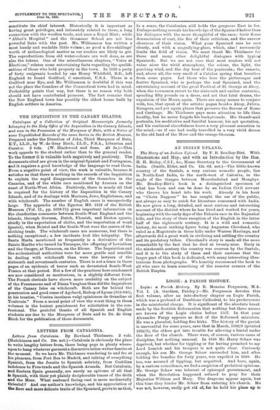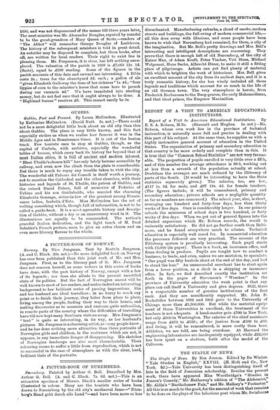Logie : a Parish History. By R. Menzies Fergusson, M.A.
Vol. I. (A. Gardner, Paisley.)—Mr. Fergusson devotes this first volume, after an introductory chapter on Logie Parish, which was a prebend of Dunblane Cathedral, to his predecessors in the ministerial charge. It is significant of the absolute break made by the Scottish Reformation that nothing but three names are known of the Logie clerics before 1567. In that year Alexander Fargy appears as first of the Reformed ministers. He was a pluralist, holding five kirks. The history of the parish is uneventful for some years, save that in March, 1592/3 (printed 1692/3), the elders got into trouble for allowing a burial under the floor of the church. There were, of course, various cases of discipline, but nothing unusual. In 1648 Mr. Harry Schaw was deprived, but whether for tippling or for having preached to my Lord Lenrick and his troopers is not quite clear. Curiously enough, his son Mr. George Schaw succeeded him, and after holding the benefice for forty years, was expelled in 1688. He too, was accused of tippling, but acquitted. And here, again, by a curious coincidence, we find a suspicion of prelatical opinions. Mr. George Schaw was tolerant of episcopal government, and when the Revolution happened refused to pray for their Majesties William and Mary. The dragoons appear again, but this time they hinder Mr. Schaw from entering his church. He was not, however, easily got rid of, for he held his place up tc 1690, and was not dispossessed of the manse till three years later. The next minister was Mr. Alexander Douglas, reputed by scandal to be the great-grandson of Mary Queen of Scots,—readers of "The Abbot" will remember George Douglas of Lochleven. The history of the subsequent ministers is told in great detail. An outsider may be disposed to complain, but these books, after all, are written for local readeri. Their right to exist lies in pleasing them. Mr. Fergusson, it is clear, has left nothing unex- plored. The valuation of the parish in 1698 is £7,063 12s. H. (Scots), equal to £588. sterling. Some of the figures in the parish accounts of this date and onward are interesting. A Bible costs 2s.; trees for the churchyard 3d. each ; a gallon of ale "given Elizabeth Galloway the time of her sickness" ls. 4d.; "four lippies of corn to the minister's horse that came here to preach during our vacancie 4d." We have translated into sterling money, but do not feel sure that it ought always to be done. A "Highland bursar" receives £3. This cannot surely be 5s.



















































 Previous page
Previous page